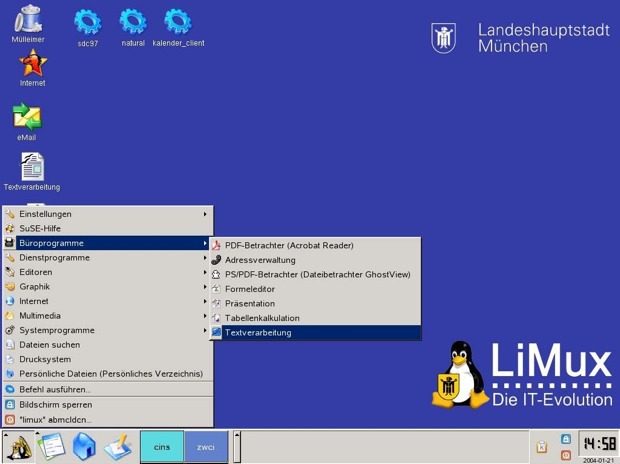Munich is ready to abandon Linux in favor of Windows 10
 The administrative and personnel committee of the city council of Munich decided to completely abandon the use of Linux and transfer all computers to Windows 10 until 2020. The coalition of social democrats and conservatives voted for this decision. The final vote of the entire city council is scheduled for November 23, 2017.
The administrative and personnel committee of the city council of Munich decided to completely abandon the use of Linux and transfer all computers to Windows 10 until 2020. The coalition of social democrats and conservatives voted for this decision. The final vote of the entire city council is scheduled for November 23, 2017.
The epic of refusing to use the operating system LiMux (based on Kubuntu) in the city administration lasts several years. This decision was actively promoted by individual members of the administration, and finally their lobbying efforts are close to success.
The administration’s decision to abandon proprietary and very expensive Windows and Microsoft Office programs was made back in 2003. The migration of 15,000 computers to free software took several years and ended in November 2013 . This was preceded by several years of training, planning and retraining of personnel.
In 2012, at the request of a public organization at the Munich City Council, a report was published on the costs of the LiMux project , which provides for the installation of Linux and OpenOffice (LibreOffice). The report compares the costs of LiMux with two technologically equivalent scenarios. The first script is Windows and OpenOffice, the second script is Windows and Microsoft Office. In the first case, only for the renewal of licenses would have to give 2.6 million euros, in the second case - 6.8 million euros. Plus, additional expenses of 4.7 million euros for upgrading equipment for new software. As a result, the total savings for the city budget for the first and second scenarios amounted to 7.1 million euros and 11.3 million euros, respectively.

Proponents of the free software movement happily noted that Munich would be the first city in Europe to completely switch to free software. But not for long music played. As it turned out, the plan for the transition to open source software was not fully realized. For example, mail servers were eventually transferred back to Microsoft Exchange, and in February 2017, the city council officially approved a return to the Windows infrastructure.
The transition back to Windows from 2014 was especially actively promoted by two members of the Conservative Party CSU, members of the city's IT council. In their opinion, the current system is “difficult to use” and has “limited functionality.” They listed several specific reasons for not using Linux , including:
- Free software is noticeably lagging behind the functionality of Microsoft software.
- For normal operation of mail on smartphones, we had to install a separate mail server (Exchange).
- There is no software for normal integrated work with mail, contacts and meetings.
- Sharing information with citizens and other municipalities is difficult because the latter use Microsoft software.
- Expectations that "Linux is cheaper" did not materialize, because it became necessary to self-refine the functionality.
According to the Social-Democratic Party member Anne Hübner, the city council requires about 800 programs (!), And about half of them are not available under Linux.
According to Hübner, “in the past 15 years, our significant efforts were aimed at gaining independence from Microsoft,” including “a lot of money was spent on finding workarounds,” but “these efforts ultimately failed.”
Now officials have come to believe that the transition to Linux was a mistake, and it is more economical to use commercial solutions that are compatible with the entire infrastructure, contain all the necessary functionality out of the box - and they do not need to be modified at their own expense.
By the final vote of the entire city council on November 23, 2017, specialists must calculate the price at which the return migration to Windows will cost. Perhaps, after this calculation, the council members will change their mind about refusing the STR. Against the transition to Windows, there is also a batch of greens, which considers Linux a safer and cheaper alternative. A representative of the Document Foundation, which develops LibreOffice, believes that the intentions of the Munich City Council are due to political reasons: “IT problems routinely arise regardless of the operating system,” he said. “When things get political, technology is powerless.”
PS It is worth adding that in 2013, Microsoft decided to move the German headquarters to Munich . An office of 26,000 m² was opened in the summer of 2016.

Microsoft Germany Headquarters in Munich
All Articles